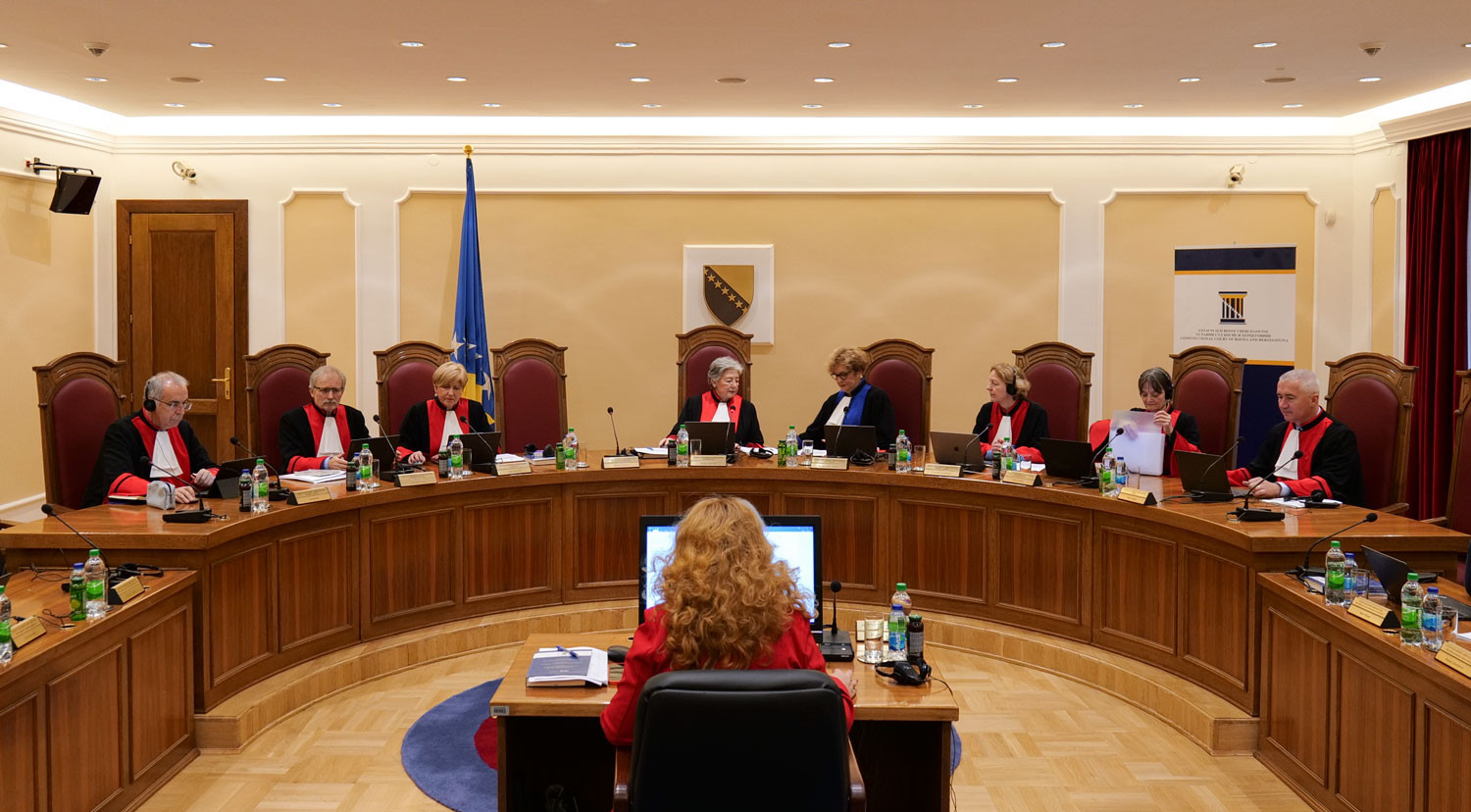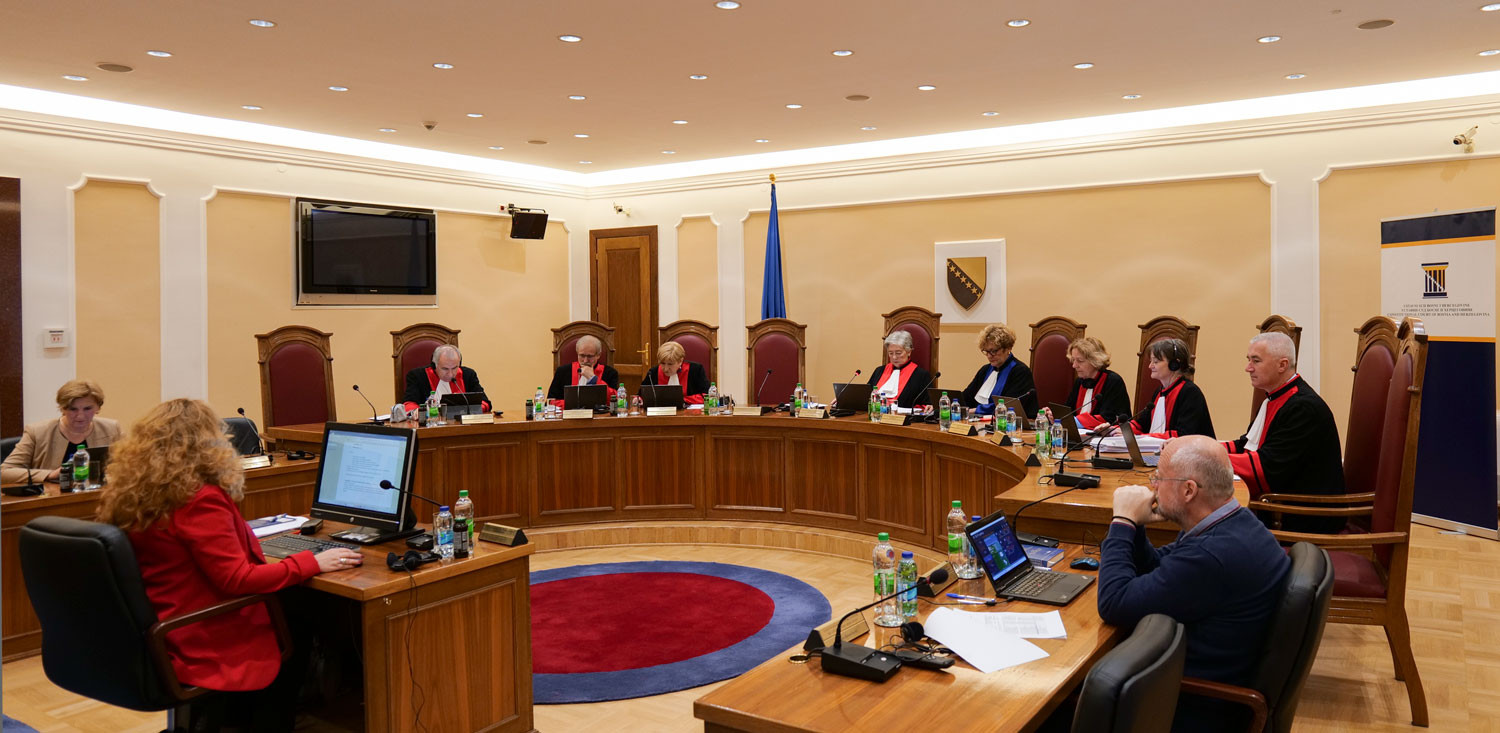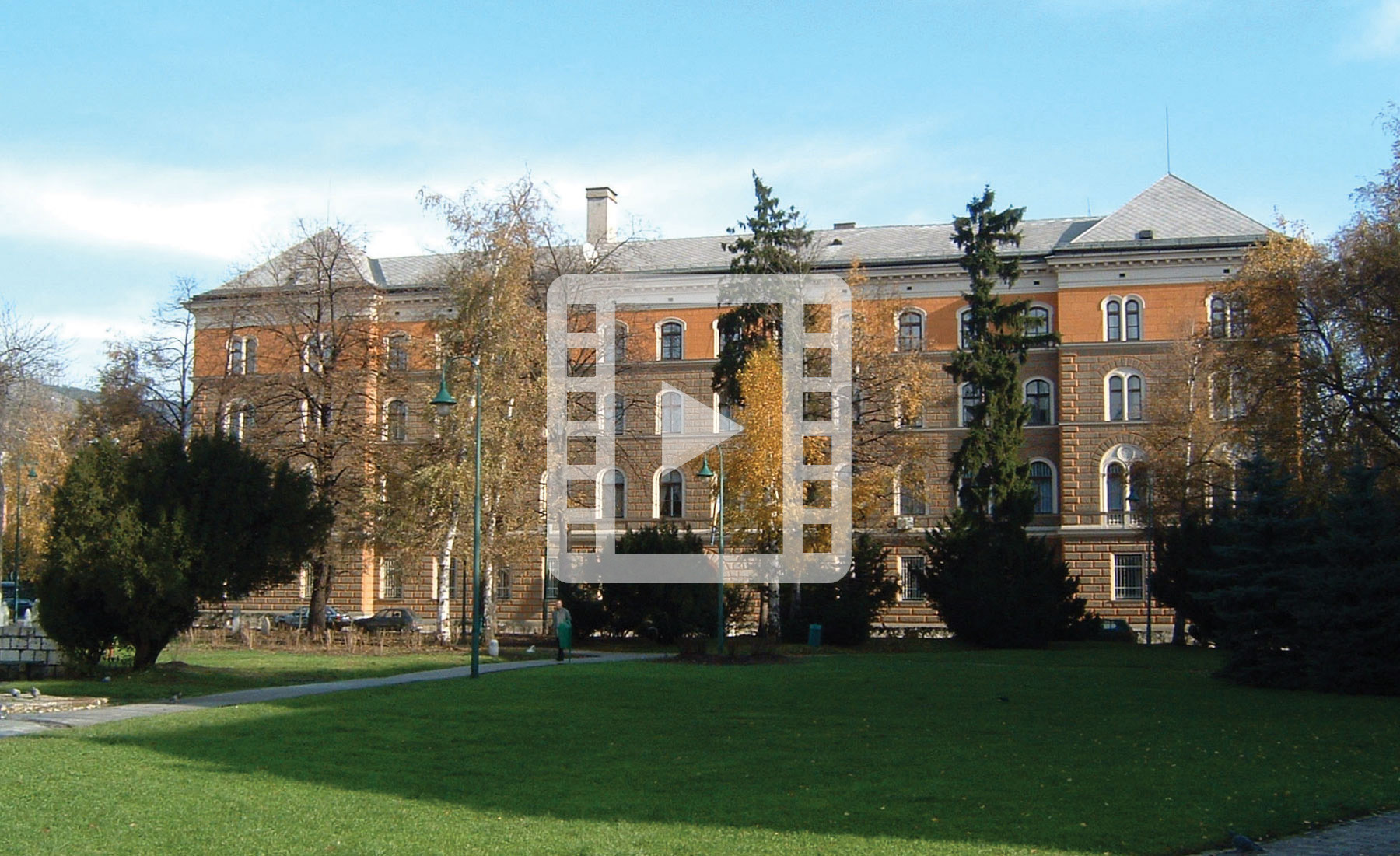The Constitutional Court of Bosnia and Herzegovina will hold its 153rd plenary session today and tomorrow in Sarajevo. At the session, it will consider requests for constitutional review and appeals, and other issues relevant for the work of the Constitutional Court.
So far, the Constitutional Court has adopted the following decision:
Decision in case no. U-20/24 – The Constitutional Court established that Article 4(1)(12) of the Rulebook on the curriculum for primary upbringing and education of the Republika Srpska (Official Gazette of the RS, 77/24) and Appendix No. 20 - Curriculum for the subject History for the 9th grade of primary school in the part related to “Topic 11, Republika Srpska and the Homeland Defence War” are not compatible with Articles I(2) and III(3)(b) of the Constitution of Bosnia and Herzegovina, as they are contrary to the standards under the Framework Law on Primary and Secondary Education in Bosnia and Herzegovina and the Common Core Curricula for history defined on learning outcomes as decisions of the Institutions of Bosnia and Herzegovina. For that reason, the Constitutional Court repealed these provisions, which shall be rendered ineffective from the date of their publication in the Official Gazette of the Republika Srpska, 77/24. Under the decision of the Constitutional Court, it is forbidden to teach the subject History for the 9th grade of primary school based on pp. 185-192 of the textbook “History for the 9th grade of primary school”, publisher: Public Company “Institute for Textbooks and Teaching Aids” a.d. Istočno Novo Sarajevo, 2024 Edition, which was approved by the act of the Ministry no. 07.041/052-4017-1/18 of 25 June 2018. The Constitutional Court tasked the Minister of Education and Culture of the Republika Srpska and the Director of the Pedagogical Institute of the Republika Srpska with the implementation of this decision.
In the reasons of the decision, the Constitutional Court notes that it has interpreted Article I(2) of the Constitution of Bosnia and Herzegovina in its hitherto case law as enshrining the principle of rule of law. The Constitutional Court emphasizes that the principle of the rule of law implies that all laws, other regulations and actions of power holders must be in compliance with the constitution. In addition, this principle requires that all entity and cantonal constitutions, laws and other regulations must be harmonized with the constitutional principles. This further means that the legal system rests on a hierarchy of legal acts, starting from the constitution as the legal act with the highest legal status and ending with by-laws. It also recalls its position about the constitutional obligation to uphold state laws, according to which “the passing of Entities’ laws contrary to the procedure prescribed under the State laws raises the issue of constitutionality of such laws within the meaning of the provisions of Article III(3)(b) of the Constitution of BiH, and that the obligations imposed under the State laws have to be complied with”. Thus, there may be a violation of Article III(3)(b) of the Constitution of BiH, including the principle of rule of law under Article I(2) of the Constitution, if Entity laws are not harmonized with a State law that contains such a requirement for a particular field.
The Constitutional Court reiterates its position that the Framework Law on Primary and Secondary Education serves as the basic normative instrument by which the state regulates the area of education in a general and principled manner, while the federal units are allowed to regulate this area more precisely, but mandatory, in accordance with the state law. The Constitutional Court points out that the Framework Law establishes a clear legal framework that obliged the Ministry of Education and Culture of the RS to organize education in a way that, inter alia, is based on rule of law and respect for human rights, develops awareness of commitment to the State of Bosnia and Herzegovina, one’s own cultural identity, language and tradition, in a way appropriate to the legacy of the civilization, and presents information or knowledge included in the curriculum in a way that supports and promotes different cultures, languages, and religions of the pupils and develops and promotes the pupils’ tolerance for diversity, multiperspectivity, openness, critical thinking and understanding of context.
In this context, the Constitutional Court notes that the disputed Appendix describing the content of the program relating to the topic “Republika Srpska and the Homeland Defence War” indicates that the curriculum stipulates that all pupils should cover the following topics: “The Inception of the Republika Srpska; The Army of the Republika Srpska and the Homeland Defence War (1992-1995); Ordeals of and crimes against Serb people and Republika Srpska after the Dayton Agreement; Culture of remembrance in local community.” In addition, according to the column related to “Learning Outcomes”, it follows that every pupil in the Republika Srpska should be able to “explain the circumstances and the significance of the establishment of the Army of Republika Srpska; cite the causes and consequences of the Homeland Defence War; cite the most important war operations of the VRS, theatres of operations and their significance; cite the sites of suffering of the Serbs during the Homeland Defence War as well as the biggest killing fields of Serbs in the 20th century; cite examples of destruction of the cultural and historical heritage of Serb people; assess the importance of fostering the culture of remembrance of the victims of the Homeland Defence War and the tradition and culture of Serb people.”
In view of the aforementioned content and the relevant provisions of the Framework Law, the Constitutional Court notes that according to the disputed part of the curriculum, i.e. the topics that should be covered, a major part of the primary school curriculum covers the topics related to the Republika Srpska and Serb people. The Constitutional Court considers that such manner of coverage which excludes perspectives of other ethnic groups, cannot be considered compatible with the Ministry’s obligation to support and foster different cultures, languages and religions of its pupils, and to develop and promote pupils’ tolerance and cultural diversity. It is completely unclear from the disputed provisions how and in what manner the listed topics relate to members of other peoples who have constituent status and the group of Others. It is also unclear how members of other peoples who have constituent status and Others are enabled in the educational process to develop awareness of commitment to the State of Bosnia and Herzegovina alongside their own cultural identity, to understand and foster the need for culture and to preserve the national cultural heritage and cultural assets, and to develop respect for diversity and opinions of others in a way that encourages equality and tolerance. In a situation where the disputed provisions of the curriculum prevent the historical views of members of other social groups from being incorporated into the practical implementation of the curriculum, the Constitutional Court holds that the disputed provisions of the curriculum cannot be regarded as being in conformity with the principles set out in Article 3 of the Framework Law.
Also, given the fact that the disputed provisions of the Rulebook and the Appendix mostly refer to the Republika Srpska and Serb people in Bosnia and Herzegovina, the Constitutional Court holds that the curriculum in the disputed part does not even meet the requirement of multiperspectivity pointed out in the Common Core. The Constitutional Court points out that such an approach is particularly necessary in multi-ethnic states such as Bosnia and Herzegovina. The Constitutional Court considers that, by applying the standards of the Framework Law and the Common Core, it was necessary to design the history curriculum for the period 1992-1995 in such a way that it covered several different perspectives in order to obtain the most objective and complete picture of past events, and to take into account the different perspectives and experiences of different ethnic, religious and cultural groups in Bosnia and Herzegovina. Without such an approach, it is not possible to achieve the objectives of education in Bosnia and Herzegovina, according to which, in terms of Article 3, paragraph 2, sub-paragraph d) of the Framework Law, it is necessary to ensure that pupils, in a way appropriate to the legacy of the civilization, learn about others and different by respecting the differences and cultivating mutual understanding and solidarity among all people, ethnic groups and communities in Bosnia and Herzegovina. In this regard, the Constitutional Court notes that the necessity of applying this principle is pointed out in the Recommendations of the Council of Ministers of BiH. In addition, the Constitutional Court notes that, according to the Recommendations of the Organization for European Security and Cooperation (OSCE) and the Recommendations of the European Commission against Racism and Intolerance (ECRI), there are considerable problems in Bosnia and Herzegovina as to the implementation of the principle of multiperspectivity in history teaching, which leads to prejudice and different interpretations of the events relating to the period 1992-1995. Furthermore, the Constitutional Court notes that the necessity of implementing the aforementioned principles is established in Article 2.3 of the Guidelines on Textbook Writing for the Subjects of History and in the relevant provisions of the Common Core for History, which emphasize the principle of multiperspectivity in history teaching.
The Constitutional Court notes that the contested provisions of the Rulebook and the Appendix were the basis for writing the Textbook approved by the Ministry. Besides, the Constitutional Court notes that the preface to the Textbook already states that “[t]he focus is on Serb people and Bosnia and Herzegovina.” After examining the content of the Textbook, the Constitutional Court notes that “ January 9” is marked as the Day of Republika Srpska, the war in Bosnia and Herzegovina is presented as a civil war, the “Declaration of the Assembly of the Serb people in Bosnia and Herzegovina” is presented, and it is stated that the Institutions of Bosnia and Herzegovina are common institutions. In addition, it states that the Republika Srpska “maintains close ties with its motherland Serbia”, and that “[t]he decision on the status of Brčko, which was part of the Republika Srpska during the war, was to the detriment of the Serb entity.” The Constitutional Court particularly emphasizes that the Textbook states the following: “[d]ecisions by the Office of the High Representative and the Constitutional Court of BiH were often against the interests of Republika Srpska”, and in the section entitled “Questions and Tasks”, one of the questions is “Which two institutions served to undermine the competences of Republika Srpska and to the centralization of BiH?” It also states the following: “[i]n the Constitutional Court of BiH, Bosniak and international judges have outvoted Serb and Croat judges in important cases. Thus, the Constitutional Court issued decisions on the constitutive status of all three peoples throughout the territory of BiH, challenging the symbols of Republika Srpska (coat of arms and anthem), as well as Republic Day (9 January), etc.”
The Constitutional Court considers that permitting such presentations in the Textbook cannot be considered compatible with the obligation arising from the provisions of Article 3, paragraph 2, sub-paragraph c) of the Framework Law, according to which the general objectives of education stemming from universally accepted values are: “promoting respect for human rights and fundamental liberties, and preparing each person for a life in a society which respects the principles of democracy and the rule of law.” Accordingly, the Constitutional Court emphasizes that educational contents, especially those related to history and society, must be harmonized with legal norms and democratic values, in order to prevent discrimination, revisionism, ideological manipulation or indoctrination of children. In this regard, the Constitutional Court recalls that education plays a key role in shaping social awareness and understanding the importance of compliance with the rule of law, which includes the obligation to comply with final court decisions. Also, failure to mention the judgements on genocide and war crimes, in the appropriate context, trivializes these crimes and negatively affects the reconciliation process, which is contrary to the values emphasized by the Preamble to the Constitution of BiH, which emphasizes the commitment to “peace, justice, tolerance, and reconciliation”, and that “democratic governmental institutions and fair procedures best produce peaceful relations within a pluralist society, [...].”
The portrayal of the Constitutional Court, as done in the Textbook, directly undermines trust in the legal order of the state, which is contrary to respect for the principles of democracy and the rule of law. In this regard, the Constitutional Court points out that highlighting “9 January” as the Day of Republika Srpska or using the phrase “common institutions” for the Institutions of Bosnia and Herzegovina, without a link to the final and binding decisions of the Constitutional Court, additionally suggest disrespect for the constitutional principle of the rule of law. The statement that “[d]ecisions by the Office of the High Representative and the Constitutional Court of BiH were often against the interests of Republika Srpska”, and asking 9th grade pupils in elementary schools in the Republika Srpska the question: “[w]hich two institutions served to undermine the competences of Republika Srpska?” only lead to creating negative attitudes towards state institutions and institutions established by the General Framework Agreement for Peace in Bosnia and Herzegovina. In this way, the awareness of commitment to Bosnia and Herzegovina is impaired, which is in direct contravention of the objective of education specified in Article 3 of the Framework Law, which requires “developing awareness of commitment to the State of BiH”.
Therefore, the Constitutional Court holds that the way the curriculum is written, in the part that refers to the historical period 1992-1995, does not meet the standards under Articles 2, 3, 36 and 42 of the Framework Law and the Common Core, and that, therefore, the contested provisions are in contravention of Articles I(2) and III(3)(b) of the Constitution of Bosnia and Herzegovina.
The Constitutional Court resumes its work.




